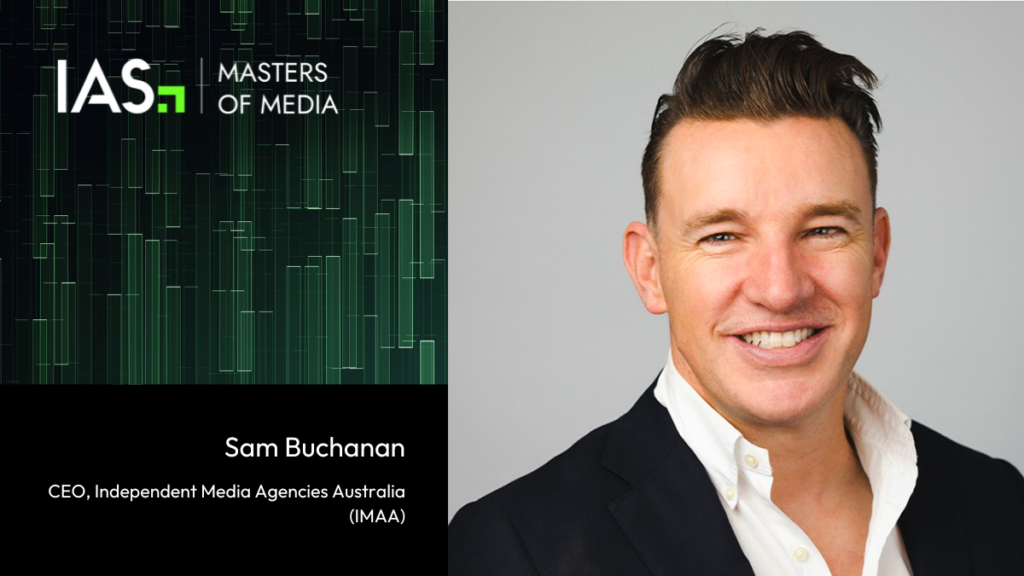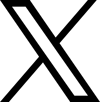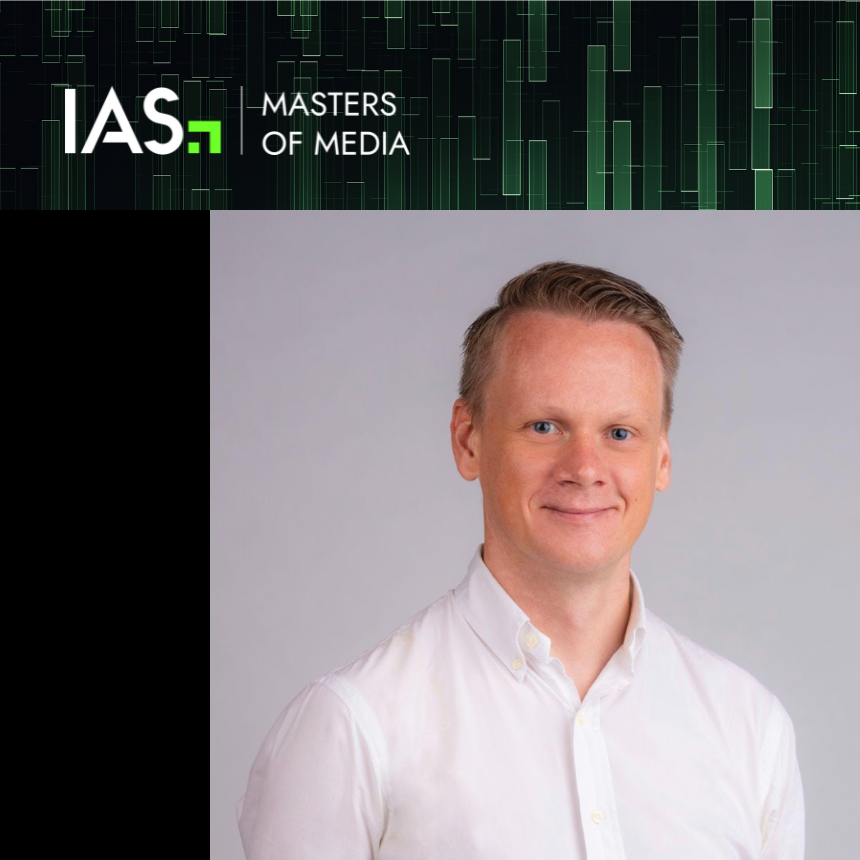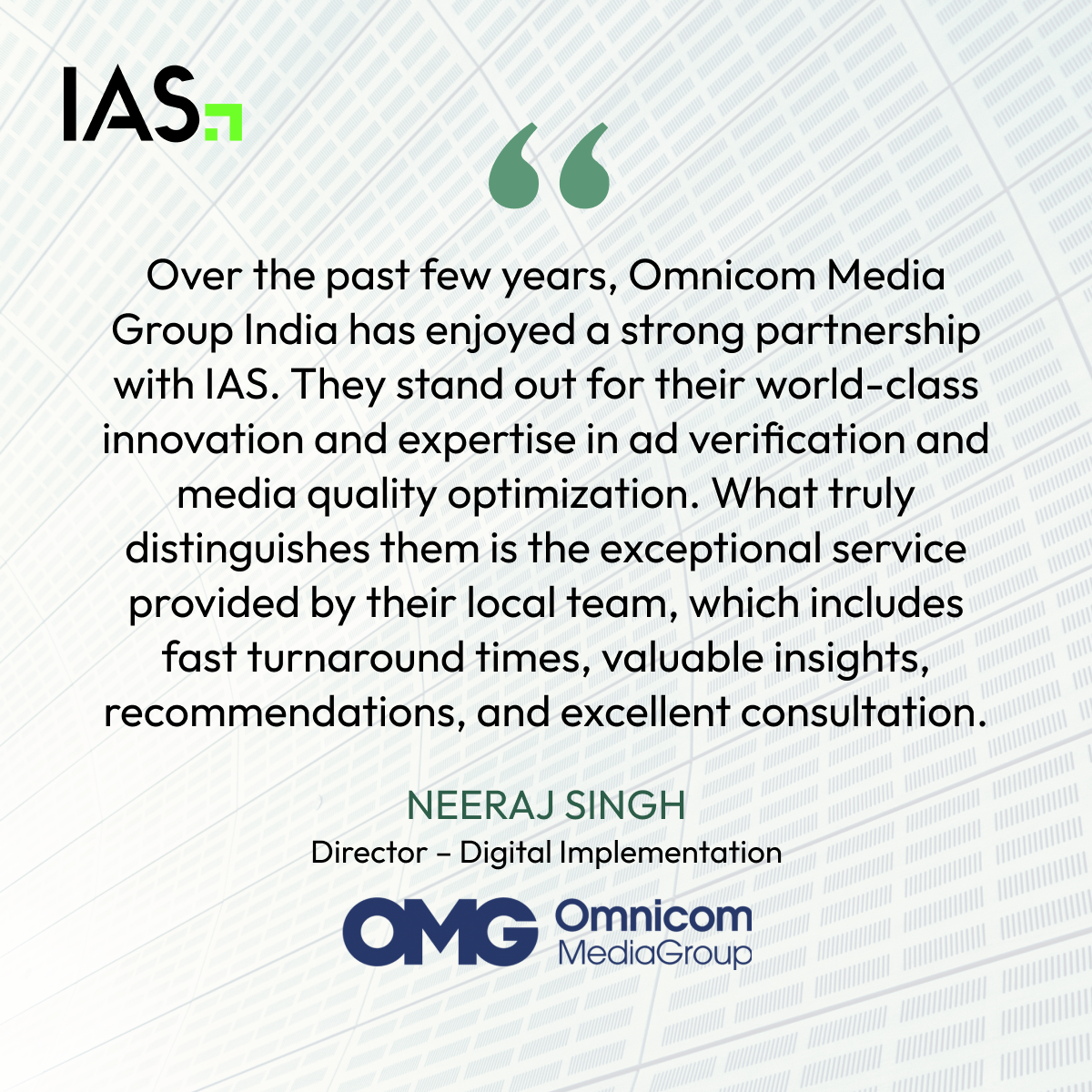
In this exclusive “Masters of Media” series, Integral Ad Science (IAS) speaks to the Movers and Shakers of the APAC advertising industry on all digital matters.
Sam Buchanan is the CEO of the Independent Media Agencies Australia (IMAA) and has more than 25 years of experience in the media and marketing industry. He started his career in broadcast media and spent almost 20 years developing a strong knowledge of the media through sales and business development roles with leading media companies Southern Cross Austereo, News Corp Australia and Fairfax Media.
His experience working with media owners, on the client side and in agencies led him on a path to the IMAA, starting with the organisation at its launch in 2020 as General Manager before taking on the role of CEO in 2022. Since joining the IMAA as General Manager and now as its CEO, Sam has fostered the growth of the IMAA, going from 20 foundation members in 2020 to more than 155 in early-2023. Sam has been instrumental in changing the media landscape and providing a voice for the media sector.
Known as a dynamic media and relationship specialist, Sam is highly regarded for raising the profile of the IMAA to be the gold standard in associations, garnering worldwide recognition for his approach and leadership.
Sam is married with two children, enjoys the outdoors and doing a bad job of coaching the local under 7’s soccer team.
Questions:
IAS: Please tell us about your journey in digital media and your current role at IMAA
Sam: I have been lucky enough to have experienced all three sides of the media equation: vendor, client and agency. My media career began on the publisher side of media where I enjoyed a variety of roles at SCA and News Corp before moving to the client side for several years.
My love of independent media agencies came when I moved to McKenzie Partners as Chief Commercial Officer. I love the opportunities that an Australian owned agency could offer, and the ability to impact real business outcomes. From there we founded the IMAA, with five other agencies in 2019, where I am CEO.
IAS: Can you shed some light on why IMAA was launched and how it has evolved since inception?
Sam: The original idea for an industry body that specifically catered to the independent media agency sector was conceived by a group of five media agencies; we desired a stronger and unified voice for the sector. We knew that the combined independent agency sector represented more than 50% of digital advertising expenditure, and by harnessing our sector and bringing everyone together, we could help advocate for and promote indie agencies to clients, lobby the government and make our industry a better, strong place along the way.
We wanted to stress the economic importance for clients to work with 100% Australian owned media agencies and since then we have worked hard to level the playing field with international holding companies with a range of initiatives, including group deals to access data tools, research and other things to achieve that.
There are many benefits for advertisers to work with independent media agencies, one of the most important being the depth and longevity of experience they provide and staff consistency and stability.
Starting our journey with 13 members, we now have more than 160 members across the country. We pride ourselves on being a progressive association and have launched a raft of initiatives including diversity and inclusion, environment and sustainability, and reconciliation.
IAS: As a professional with vast experience in digital media, what advice would you give to someone starting their journey in this field?
Sam: Always be curious, always ask questions and find a great mentor.
If you are starting out, then sign up to our new education initiative, the IMAA Academy, our e-learning course that has a Digital module, as well as all other media channels to get a well-rounded understanding of the industry.
IAS: How is IMAA helping media agencies to propagate the AdTech space?
Sam: We have partnered with the world’s best digital and ad tech companies including IAS. These partners help bridge the education gap through our platforms and channels.
We have a learning hub to ensure our members are across the latest and greatest training and certification.
We host regular webinars where our partners and guests are able to present to our members, offering education, the latest insights, trends and research to ensure all members are fully up to date with the ever changing AdTech space.
IAS: In your opinion, what are some challenges that Australian independent media agencies are facing in today’s world?
Sam: Our greatest challenge – although I prefer to see it as an opportunity – is to convince larger clients and the Government of the benefits of working with independent agencies. We can truly compete with the multinationals now, not to mention the benefit of getting to work with the people who own the agency and, importantly in this economic climate, the ability to be nimble and agile.
We are actively lobbying both the Federal and State governments to include a provision for a proportion of government ad spend to go to the independent, Australian-owned, indie media agency sector. We firmly believe that the government has a social and economic responsibility to support Australian owned businesses, so money spent and taxes remain in Australia.
Our second biggest challenge is talent – finding it and retaining it. We have launched various initiatives to address this – including our IMAA Academy e-learning program and we recently launched a trade campaign in the UK to attract talent to live and work in Australia at indie agencies. We’ve seen a definite trend where multinational agency executives have decided to move to an indie agency – for many reasons, but mainly because they have greater flexibility, more control of their destiny and can make a real difference to clients’ business outcomes.
IAS: What are some ways for agencies and organisations in the media landscape to monitor and reduce their environmental impact?
Sam: The environment and sustainability is one of the key strategic pillars of the IMAA.
This is a big issue among our members, with one of our Pulse Surveys finding that three quarters of our members said that the environment was important to their agency. Another 58% said they are expecting that a media owner’s sustainability credentials, such as carbon offsetting capabilities and carbon-neutral products, will start to influence their buying decisions.
We began by hosting two carbon positive events, in partnership with C2Zero.
Late last year we launched IMAA Project Earth, a series of initiatives and partnerships to help develop environmental management and sustainability within the indie media agency sector and greater media landscape.
We partnered with several environmental organisations including Trace, C2Zero, Scope3, Net Zero Media and SeenThis to help achieve this vision. And for the IMAA itself, we partnered with Trace to become a carbon neutral organisation.
This initiative and partnerships are designed to educate and offer support to our members on how to run a sustainable campaign and become a carbon neutral business.
And this year for the first time our members from across the country participated in Clean Up Australia Day’s corporate day.
We see our role as helping our members to achieve their sustainability goals.
IAS: Any advice for leaders on talent retention and supporting/ encouraging diversity at workplaces?
Sam: We firmly believe that independent media agencies offer talent a fantastic career and workplace. Our members have so many staff benefits, from unlimited leave, flexible working options, and mental health training. At an independent media agency, people really feel like they are part of something and have a real opportunity to make a difference.
The IMAA wants to lead by example. We have launched a raft of initiatives for career support, including the IMAA Academy, a Careers Board and a subsidised Leaders for Good DEI course. We have a Diversity & Inclusion Council, that has recently launched a mentor program for women in independent media agencies. And we have ratified our Reconciliation Action Program (RAP) as part of our mission to make a difference in the media industry by educating them on Aboriginal and Torres Strait Islander peoples and cultures, including supporting First Nations charity, Kings Narrative.
IAS: What’s your favourite book/podcast/movie and why?
Sam: I’m reading Breath: The New Science of a Lost Art by James Nestor (I am obsessed); streaming – Succession. So many podcasts – but SmartLess is a great one!
 Share on LinkedIn
Share on LinkedIn Share on X
Share on X

